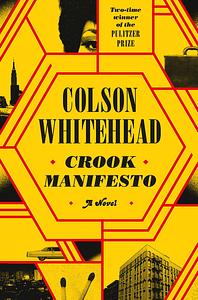Take a photo of a barcode or cover
mysterious
reflective
fast-paced
Plot or Character Driven:
Character
Strong character development:
No
Loveable characters:
Complicated
Diverse cast of characters:
Yes
Flaws of characters a main focus:
Yes
dark
tense
medium-paced
Plot or Character Driven:
Plot
Strong character development:
Yes
Loveable characters:
Yes
Diverse cast of characters:
No
Flaws of characters a main focus:
Yes
adventurous
funny
slow-paced
Plot or Character Driven:
A mix
Strong character development:
Yes
Loveable characters:
Complicated
Diverse cast of characters:
Yes
Flaws of characters a main focus:
Yes
adventurous
dark
funny
informative
lighthearted
mysterious
tense
slow-paced
Plot or Character Driven:
A mix
Strong character development:
No
Loveable characters:
Complicated
Diverse cast of characters:
Yes
Flaws of characters a main focus:
Yes
Different types of capers to the first and ultimately less interesting - helping a dirty cop, finding a missing person, arsonist culture.
A lot of Pepper - like Brad Pitt on a mission in OUATIH.
Very Tarantino-y in tone and construction.
A lot of Pepper - like Brad Pitt on a mission in OUATIH.
Very Tarantino-y in tone and construction.
Part two of Ray Carney finds the furniture salesman prosperous in the 1970s but still drawn in by the illicit.
adventurous
challenging
tense
medium-paced
Plot or Character Driven:
Plot
Strong character development:
Complicated
Loveable characters:
Yes
Diverse cast of characters:
Yes
Flaws of characters a main focus:
Yes
"Survival meant manipulating flaws and outwitting the system."
Crook Manifesto is definitely going to have a negative influence on me, especially considering what is happening in 2025.
Much like Harlem Shuffle, Crook Manifesto explores the evolution of Harlem (and New York) through the life of Ray Carney. Taking place in the 1970s, Carney and his neighborhood are suffering major trials and tribulations. The promises of black equality and progress that manifested themselves in the 1960s are clearly an illusion a decade later. How Carney, Harlem, and (black) New York adjust to these transformations (or better yet, continued hardships) is the central question of the novel.
Personally, the novel picks up once we get to "Part 2: Nefertiti TNT." By that point, I was better able to handle the sudden pov changes (Whitehead switches without any heads up) and ignore all the city details (unless you know the space, it is simply overwhelming information that adds nothing). While it was nice to get Munson back and his adventure with Carney sets up later developments, it took most of that section to adjust to Whitehead's style. For those well-versed in the layout of Harlem, the details of streets and cross-streets will matter, but the rest of us will not understand the significance of this; it's simply a fact.
As someone vaguely familiar with 1970s history and New York's struggle during that time, I enjoyed how Whitehead threaded these larger processes into the personal narratives. I also liked that Whitehead incorporated Pepper more (I don't remember him being a fixture in Harlem Shuffle). Carney is very much trying to move past his crooked inclinations under the assumption that he is above it/no longer needs to lean on these traits for survival (He's "come along way."). By contrast, Pepper recognizes that it is the one constant in life; the details of crime and criminals might change, but they will always exist. Pepper is comforted by this knowledge while Carney is trying to reject this premise. As Carney learns by the end of the novel, ignorance isn't something he can afford and it only makes one vulnerable to forces and systems designed to take advantage of the poor/minorities (not even the Dumas Club's association with black wealth saved it from destruction )
In many ways, Whitehead's Harlem series is reminiscent of Walter Mosley's Easy Rawlins series. They examine how larger historical forces greatly shaped the black urban experience and do so in a way that doesn't feel like a history lesson.
Crook Manifesto is definitely going to have a negative influence on me, especially considering what is happening in 2025.
Much like Harlem Shuffle, Crook Manifesto explores the evolution of Harlem (and New York) through the life of Ray Carney. Taking place in the 1970s, Carney and his neighborhood are suffering major trials and tribulations. The promises of black equality and progress that manifested themselves in the 1960s are clearly an illusion a decade later. How Carney, Harlem, and (black) New York adjust to these transformations (or better yet, continued hardships) is the central question of the novel.
Personally, the novel picks up once we get to "Part 2: Nefertiti TNT." By that point, I was better able to handle the sudden pov changes (Whitehead switches without any heads up) and ignore all the city details (unless you know the space, it is simply overwhelming information that adds nothing). While it was nice to get Munson back and his adventure with Carney sets up later developments, it took most of that section to adjust to Whitehead's style. For those well-versed in the layout of Harlem, the details of streets and cross-streets will matter, but the rest of us will not understand the significance of this; it's simply a fact.
As someone vaguely familiar with 1970s history and New York's struggle during that time, I enjoyed how Whitehead threaded these larger processes into the personal narratives. I also liked that Whitehead incorporated Pepper more (I don't remember him being a fixture in Harlem Shuffle). Carney is very much trying to move past his crooked inclinations under the assumption that he is above it/no longer needs to lean on these traits for survival (He's "come along way."). By contrast, Pepper recognizes that it is the one constant in life; the details of crime and criminals might change, but they will always exist. Pepper is comforted by this knowledge while Carney is trying to reject this premise. As Carney learns by the end of the novel, ignorance isn't something he can afford and it only makes one vulnerable to forces and systems designed to take advantage of the poor/minorities (
In many ways, Whitehead's Harlem series is reminiscent of Walter Mosley's Easy Rawlins series. They examine how larger historical forces greatly shaped the black urban experience and do so in a way that doesn't feel like a history lesson.
It’s a bit, Just When I Thought I Was Out They Pull Me Back In, but to great effect. Whitehead is a fantastic writer. I tried to pay more attention this go around as to what I particularly like, and his Thing that I really like is using a great metaphor, which is subsequently qualified. Most writers cannot pull this off at all. But Whitehead manages to get the full effect and then add a completely new layer of depth to the character with the qualification, which cuts out so much additional sentences that would tell the reader about the character, at some point.
Usually the qualifications feed into the historical aspects of the novel. Greater themes around gentrification, racism, but also the culture of the time. Which is wild because many of the lifted events from the time I recall, albeit vaguely. It’s part of getting older I guess, and an interesting feeling to feed into a novel. Maybe one of the first times nostalgia has worked for me because I could situate events, as well as the disparity of those things contrasted to my own life, making the setting highly effective.
Once again, though, I also was not completely blown away. I think I’ve yet to give any of Whitehead’s novels 5 stars, but they are always on the cusp of it. Honestly, the fact that they’re so solid all the time may be a case for them being bumped up.
Usually the qualifications feed into the historical aspects of the novel. Greater themes around gentrification, racism, but also the culture of the time. Which is wild because many of the lifted events from the time I recall, albeit vaguely. It’s part of getting older I guess, and an interesting feeling to feed into a novel. Maybe one of the first times nostalgia has worked for me because I could situate events, as well as the disparity of those things contrasted to my own life, making the setting highly effective.
Once again, though, I also was not completely blown away. I think I’ve yet to give any of Whitehead’s novels 5 stars, but they are always on the cusp of it. Honestly, the fact that they’re so solid all the time may be a case for them being bumped up.
Not quite as good as the previous book - there was a lot of jumping around that got very disorientating. However, the end was so satisfying it's hard to stay mad
challenging
dark
reflective
sad
tense
slow-paced
adventurous
challenging
funny
mysterious
tense
medium-paced


